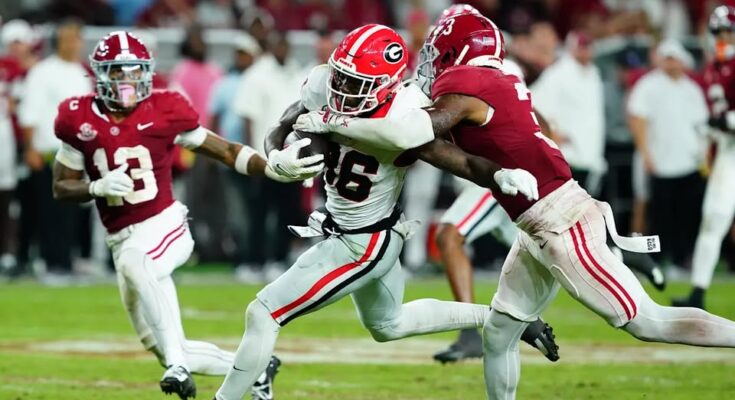The Georgia Bulldogs and the Alabama Crimson Tide share one of college football’s most storied rivalries, a clash of titans that has spanned over a century. Since their first meeting in 1895, these two Southeastern Conference (SEC) powerhouses have faced each other numerous times, with Alabama historically holding the advantage. However, Georgia has experienced periods of dominance, and recent matchups have showcased the Bulldogs’ resurgence as a formidable force in college football.
Alabama leads the all-time series 44–26–4, reflecting a longstanding period of dominance. The Crimson Tide’s success can be attributed to legendary coaches like Paul “Bear” Bryant and Nick Saban, who have built dynasties characterized by disciplined defense, potent offenses, and consistent national championship contention. Under Bryant, Alabama became a national powerhouse, securing multiple national titles and establishing a tradition of excellence. Saban continued this legacy, leading the team to numerous championships and maintaining Alabama’s status as a perennial contender.
In contrast, Georgia’s football program has experienced periods of both success and struggle. The Bulldogs’ most notable era of dominance came in the late 1940s and early 1980s. In 1942, under head coach Wally Butts, Georgia secured a national championship, and in 1980, led by legendary running back Herschel Walker, the Bulldogs captured another national title. These successes were followed by periods of rebuilding, with Georgia striving to return to national prominence.
The rivalry reached a new level of intensity in the 21st century, particularly with the hiring of Kirby Smart as Georgia’s head coach in 2016. Smart, a former Alabama defensive coordinator under Saban, brought a wealth of experience and a deep understanding of Alabama’s program. His arrival signaled a shift in Georgia’s fortunes, as the Bulldogs began to consistently compete at a high level.)
Despite Smart’s familiarity with Alabama’s system, his early years at Georgia were marked by near-misses against the Crimson Tide. In the 2018 College Football Playoff National Championship, Georgia held a 13–0 lead at halftime, only to see Alabama rally in the second half, with freshman quarterback Tua Tagovailoa leading the Tide to a 26–23 overtime victory. This loss was a bitter pill for Georgia, as it showcased the fine margins that often separate elite programs.
The 2021 SEC Championship Game further highlighted Alabama’s dominance, as the Crimson Tide defeated Georgia 41–24. Alabama’s offense, led by quarterback Bryce Young, exposed vulnerabilities in Georgia’s defense, underscoring the challenges the Bulldogs faced in overcoming their rivals.
However, the tides began to turn in the 2022 College Football Playoff National Championship. Georgia avenged its earlier losses to Alabama with a decisive 33–18 victory, securing the program’s first national title since 1980. Quarterback Stetson Bennett delivered a standout performance, and the Bulldogs’ defense, which had been a hallmark of their success, stifled Alabama’s offense. This victory not only marked a significant achievement for Georgia but also signaled the emergence of a new era in the rivalry.
The 2024 season continued to showcase the competitive nature of the rivalry. In a closely contested game, Alabama edged out Georgia 41–34 in Tuscaloosa, extending their current winning streak to two games. This victory highlighted Alabama’s resilience and ability to perform in high-pressure situations, maintaining their competitive edge over Georgia.
Looking ahead, the rivalry between Georgia and Alabama remains one of the most anticipated matchups in college football. Both programs boast rich histories, passionate fanbases, and a commitment to excellence. As Georgia continues to build upon its recent successes and Alabama seeks to reclaim its position at the top, future encounters promise to deliver thrilling football and further chapters in this legendary rivalry.
While Alabama has historically held the upper hand in the Georgia-Alabama football rivalry, recent developments suggest a shift in the balance of power. Georgia’s resurgence, fueled by strategic leadership and player development, has brought renewed excitement to the series. As both programs continue to evolve, the rivalry is poised to remain a central narrative in college football, captivating fans and shaping the landscape of the sport for years to come.



